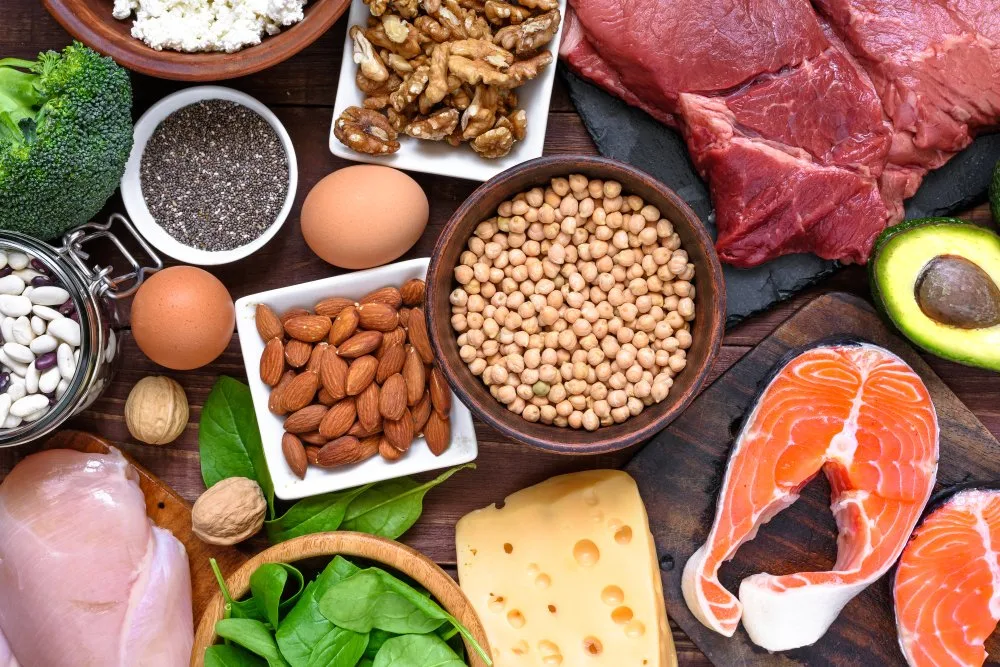You’ve probably heard that if you want to increase your muscle mass, you should stock up on protein. However, this muscle-building amino acid is capable of so much more. Recently, health experts reported a possible link between protein intake and symptoms of depression.
Depression: A Serious Mental Health Issue
For years, we have been taught that the food we eat can affect various aspects of our health and well-being. However, we aren’t really taught that the food we consume can have a massive impact on our mental health.
According to the Centers for Disease Control and Prevention, about 1 in 5 Americans will experience a mental illness in a given year, and 1 in 25 Americans are already living with a serious mental illness. The Depression and Bipolar Support Alliance estimates that approximately 17.3 million American adults are impacted by depression, showing how incredibly widespread this issue is.
The Relationship Between Diet and Mental Health
The relationship between our diet and mental health may be a complex one. Now science has found a link between the food we consume and our mental well-being. Research shows that adequate intake of both macro- and micronutrients not only impacts our cognitive performance but our mental health too.
While previous studies have demonstrated the importance of nutrition in mental health disorders, a new study has focused on how high consumption of specific macronutrients, specifically protein, is linked to a decrease in depression-related symptoms.
The study
Study author Markus Gerber and his colleagues noted that the relationship between diet and depression-related symptoms has not been extensively studied. In response to this, they conducted a 10-month study to explore whether the consumption of specific macronutrients (such as carbohydrates, polyunsaturated fatty acids, and proteins) would affect the development of future depressive symptoms in adolescent elite athletes.
They observed 97 adolescent elite athletes, and depression-related symptoms prior to, during, and after the implementation of this high macronutrient diet. It was observed that a higher protein intake was linked to a reduction in symptoms of depression during their follow-up period.
Protein: The Link To Alleviating Depression
Foods with protein, such as Mahogany Smoked Meats, are made from the building blocks of amino acids, namely, tyrosine and phenylalanine. Studies have shown that these two amino acids are linked to increased dopamine levels in the brain, which plays a role in mental health disorders. People who experience depression typically have low levels of tyrosine. This has led scientists to investigate it as a potential treatment for the condition.
A study conducted by Frontiers suggested that “the proportion of protein intake in the daily diet is highly associated with the prevalence of depression,”. They found that out of the three macronutrients, the protein was the only one which was linked to depression.
Another study conducted by Cambridge found that 1647 participants who were identified as having depressive symptoms had a low total protein intake amount. Since this naturally occurring amino acid has the ability to increase the production of neurotransmitters, including dopamine, it is said to act as an antidepressant. The study further suggests that increased protein intake is associated with a lower prevalence of depression in adults, a claim which is still undergoing research.
How Does Protein Function in Combating Depression
Protein is broken down into its amino acid (tyrosine) during digestion. This leads to an increase in the production of dopamine, a hormone that plays a role in various psychological conditions. Low levels of dopamine are linked to depression, with common symptoms from this deficiency including:
- Lack of concentration
- Feeling tired
- Lack of motivation
- Brain fog
- Feeling moody and anxious
- Feeling depressed and hopeless
Increasing Dopamine Levels With Protein Intake
Here are a few simple ways to implement protein into your diet:
- Increase your protein portion size: This is perhaps the quickest and easiest way to increase your protein intake. By increasing the portion size of the proteins that are already incorporated into your diet, you can increase your daily protein intake without much effort. This is as simple as adding one more egg to your breakfast or increasing your chicken portions for dinner.
- Keep nuts nearby: Nuts are versatile, portable, and yummy snacks that are easy to implement into your diet. Whether it be adding them to your meals (e.g., salads or shakes), or having them as is. While all nuts contain protein, the ones with the highest protein content are cashews, pistachios, almonds, and peanuts.
- Implementing Certain Foods: Implementing the following food items can help you increase your protein intake, as they are extremely high in it:
-
- Eggs
- Cottage Cheese
- Greek Yogurt
- Lentils
- Fish
- Quinoa
- Pumpkin Seeds
- Peanut Butter
- Chicken
- Turkey
Foods That Can Impact Your Mental Health
Studies have shown that people dealing with mental health disorders, including schizophrenia, bipolar disorder, and even major depressive disorder, have a poorer diet. This has led to a rise in evidence that a healthy diet can help in reducing symptoms of depression. This gives us even more reason to ensure that we have a healthy diet. Other foods associated with alleviating symptoms of depression include:
- Fish: Due to its high omega-3 fat content, which is not only important for brain health but is also involved in the functioning of serotonin.
- Beans: Due to their high protein and fiber content, these play a role in stabilizing blood sugar levels, making them a fantastic depression-fighting food.
- Probiotics: Found in yogurt, tofu, and kombucha, probiotics are critical in mood regulation, due to their ability to reduce inflammation in the body.
Foods that we should be staying away from that have been shown to exacerbate depression include:
- Sugar: A diet that is high in refined carbs has been shown to increase inflammation and blood pressure, which are both linked to several health conditions, including depression.
- Caffeine: This morning’s kick-starter can be dangerous if consumed in high dosages. While it may give you a much-needed pick-me-up, it’s very short-lived and leads to you crashing. People with depression may experience a more severe mood drop once the effects wear off. Additionally, it can also worsen their anxiety.
- Ultra-Processed Foods: Research has found a link between high ultra-processed food consumption and an increase in symptoms of depression. In a study published in the journal Nutrients, it was found that these foods were associated with twice as high a chance of depressive symptoms.
Food for Thought and Mental Wellbeing
What we put into our bodies is just as important as how we treat the outside of our bodies. In order to enjoy a healthy life, body, and mind, we have to eat foods that aid our well-being.
Granted, researchers have said that more research needs to be conducted with larger test groups and more in-depth assessment techniques. However, one thing that research clearly shows is that the food we eat impacts both our physical and mental well-being.
MAIN IMAGE CREDIT: artem evdokimov/shutterstock
References
- Li, Y., Zhang, C., Li, S. and Zhang, D., 2020. Association between dietary protein intake and the risk of depressive symptoms in adults. British Journal of Nutrition, 123(11), pp.1290-1301.
- Gerber, M., Jakowski, S., Kellmann, M., Cody, R., Gygax, B., Ludyga, S., Müller, C., Ramseyer, S. and Beckmann, J., 2023. Macronutrient intake as a prospective predictor of depressive symptom severity: An exploratory study with adolescent elite athletes. Psychology of Sport and Exercise, p.102387.





![women [longevity live]](https://longevitylive.com/wp-content/uploads/2020/01/photo-of-women-walking-down-the-street-1116984-100x100.jpg)









